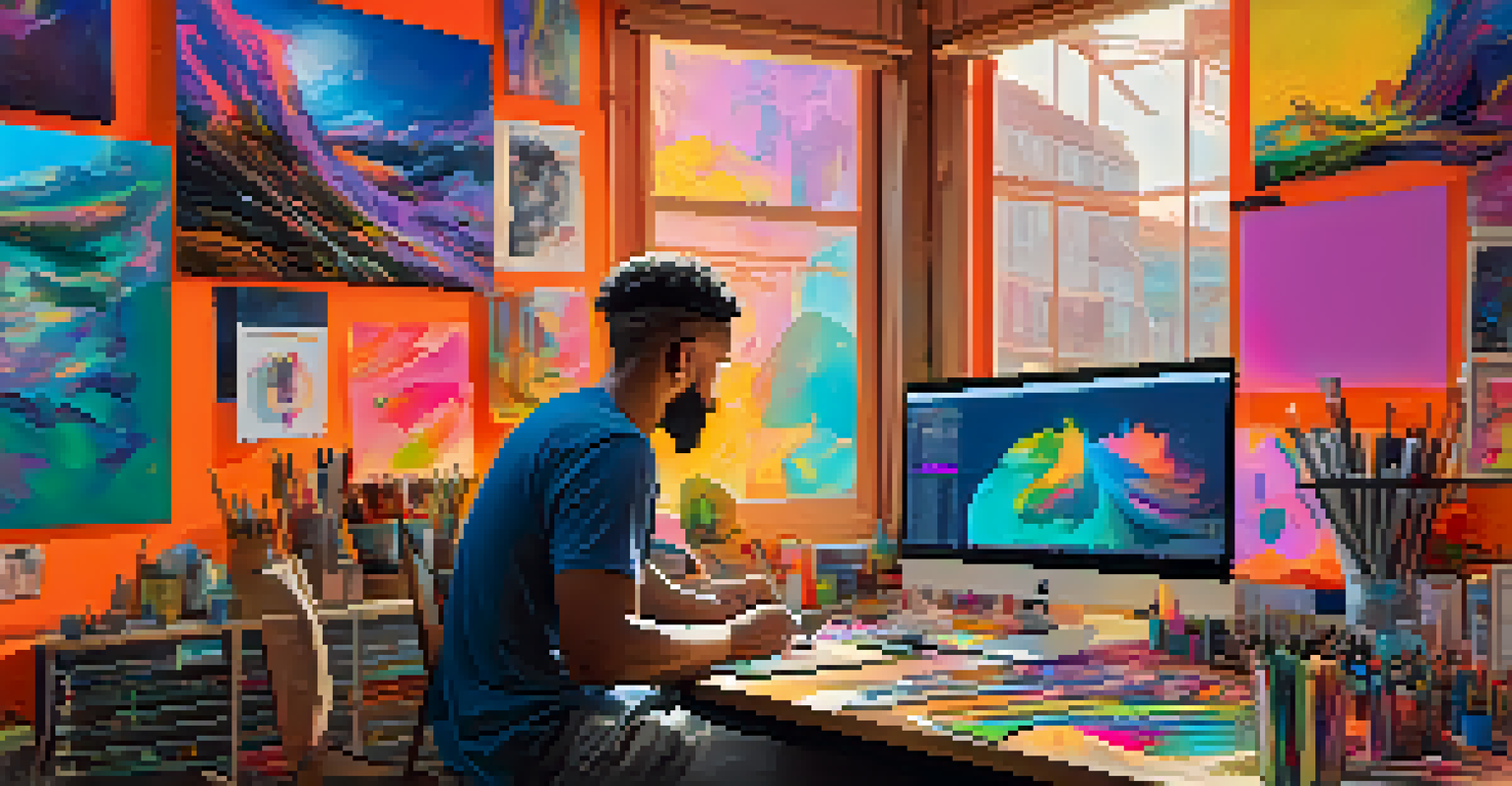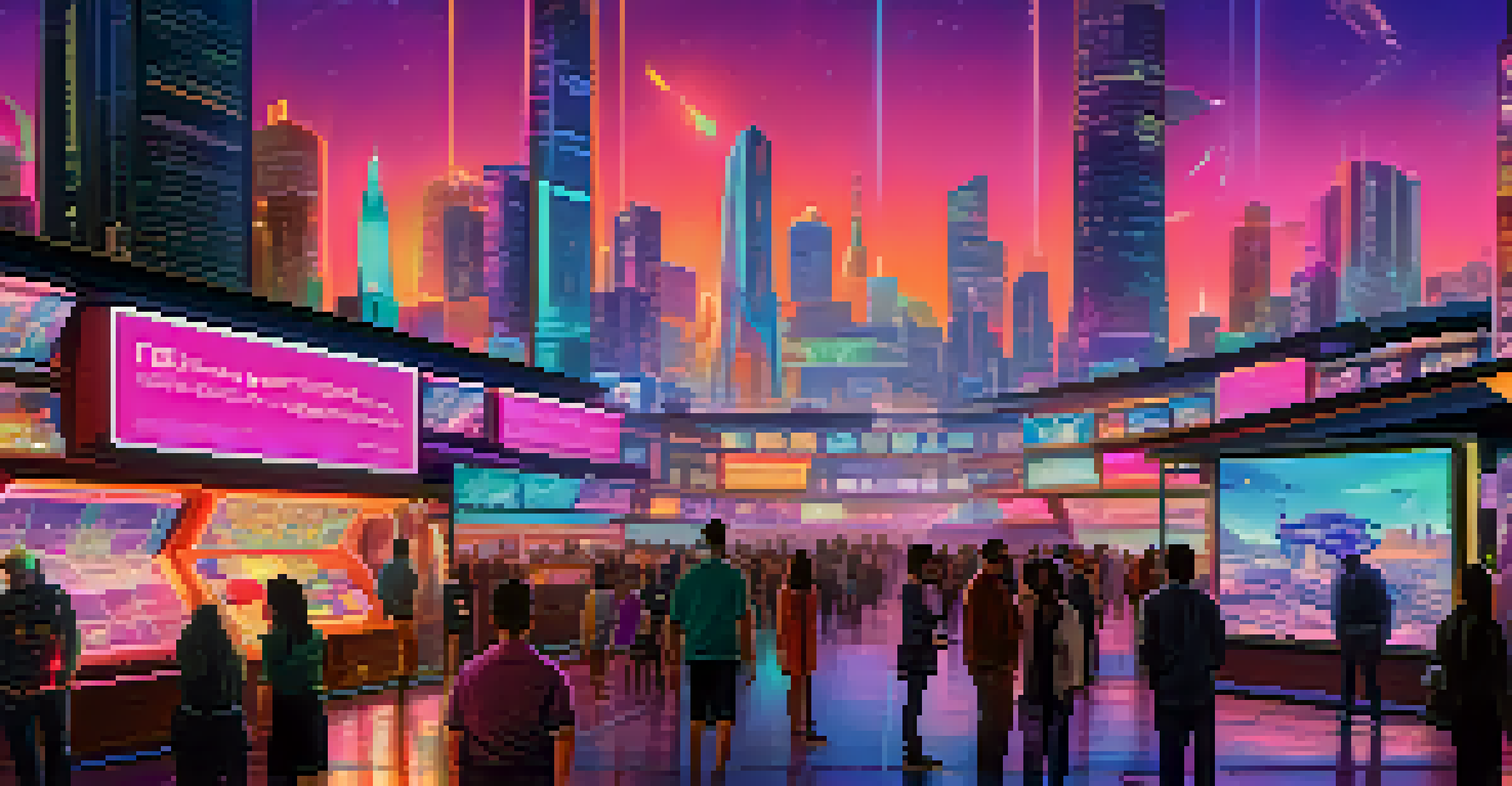Digital Marketplaces: Where to Buy and Sell NFTs Effectively

Understanding NFTs and Their Popularity
NFTs, or non-fungible tokens, have surged in popularity, revolutionizing the way we view digital ownership. Unlike cryptocurrencies, NFTs are unique assets, each with its own distinct value, making them highly sought after by collectors and creators alike.
NFTs are a new way to own and trade digital assets, creating a revolution in how we think about ownership and value in the digital space.
Imagine owning a digital piece of art or music that no one else can replicate; that's the allure of NFTs. Their rise can be attributed to their ability to authenticate ownership and provenance, which resonates well in today’s digital age.
As more artists, musicians, and brands jump on the NFT bandwagon, understanding this trend can help you navigate the digital marketplace effectively, whether you’re buying or selling.
Choosing the Right Marketplace for NFTs
Not all marketplaces are created equal, and choosing the right one is crucial for a successful NFT transaction. Some platforms specialize in art, while others might focus on music or gaming assets, so identifying your niche can save you time and effort.

Popular NFT marketplaces like OpenSea, Rarible, and Foundation cater to different audiences and offer unique features. For instance, OpenSea is renowned for its vast selection, while Foundation has a more curated approach, attracting serious artists and collectors.
NFTs Redefine Digital Ownership
NFTs provide unique digital assets that authenticate ownership and provenance, appealing to collectors and creators.
Before diving in, consider factors like fees, user interface, community trust, and the types of NFTs available. A well-suited marketplace can enhance your buying and selling experience.
Creating and Minting Your Own NFTs
If you're an artist or creator looking to sell your work as an NFT, you'll need to mint it first. Minting is the process of turning your digital file into an NFT on the blockchain, making it available for purchase.
The future of NFTs is about more than just art; it's about creating new experiences, new forms of interaction, and new ways to connect with audiences.
Most marketplaces provide straightforward tools for minting your NFTs, often allowing you to upload your artwork, set your price, and add essential details like royalties for future sales. This process is usually user-friendly, even for those not tech-savvy.
Once minted, your NFT can be listed for sale, giving you the chance to showcase your creativity while tapping into a global market of potential buyers.
Setting the Right Price for Your NFTs
Pricing your NFT can be a tricky task; too high, and you might scare away buyers, too low, and you undervalue your work. Research similar NFTs in your niche to gain insight into what collectors are willing to pay.
Consider factors like the uniqueness of your work, the demand within the marketplace, and any associated costs, such as gas fees for transactions on Ethereum. A strategic approach to pricing can make all the difference in your sales success.
Choosing the Right NFT Marketplace
Selecting the right marketplace is crucial, as different platforms cater to various niches and offer unique features.
Additionally, don't hesitate to adjust your pricing based on market trends or feedback from collectors. Flexibility can help you find the sweet spot for your NFTs.
Promoting Your NFTs Effectively
Promotion is key in the crowded NFT space. Social media platforms like Twitter, Instagram, and Discord are excellent for connecting with potential buyers and building a community around your work.
Creating engaging content, such as behind-the-scenes looks at your creative process or sharing stories about your artwork, can attract attention. Collaborating with other artists or influencers can also amplify your reach.
Don't underestimate the power of storytelling when promoting your NFTs; showcasing the inspiration behind your work can create a deeper connection with potential buyers.
Navigating NFT Market Trends
The NFT market is ever-evolving, and staying abreast of trends can give you an edge in buying and selling. Watching how certain NFTs perform can provide valuable insights into what types of art or assets are gaining popularity.
Following NFT analysts and participating in discussions within communities can help you predict market movements. Understanding seasonal trends or shifts in collector interests will prepare you to make informed decisions.
Legal Aspects of NFT Transactions
Understanding copyright and intellectual property laws is essential to navigate potential legal issues when buying or selling NFTs.
Being proactive about market trends can not only enhance your buying experience but also position you as a knowledgeable seller in the NFT space.
Understanding Legal Considerations in NFT Transactions
As with any digital asset, there are legal considerations when buying and selling NFTs. Copyright issues can arise, especially if you’re not the original creator of the work being sold.
Always ensure that you have the rights to sell or transfer any digital asset as an NFT. Familiarizing yourself with intellectual property laws is crucial to avoiding disputes or potential legal troubles.

Being informed about the legal landscape can protect your interests and foster a more ethical NFT marketplace.
The Future of NFTs and Digital Marketplaces
The potential of NFTs goes beyond art and collectibles; industries like gaming, real estate, and music are beginning to explore their applications. As technology advances, we can expect to see more innovative uses for NFTs.
Digital marketplaces will likely evolve to accommodate these changes, offering new functionalities and better user experiences. Keeping an eye on emerging technologies, like virtual reality and blockchain advancements, can provide insight into future trends.
Ultimately, the future of NFTs is bright, and being adaptable will be key to thriving in this dynamic marketplace.